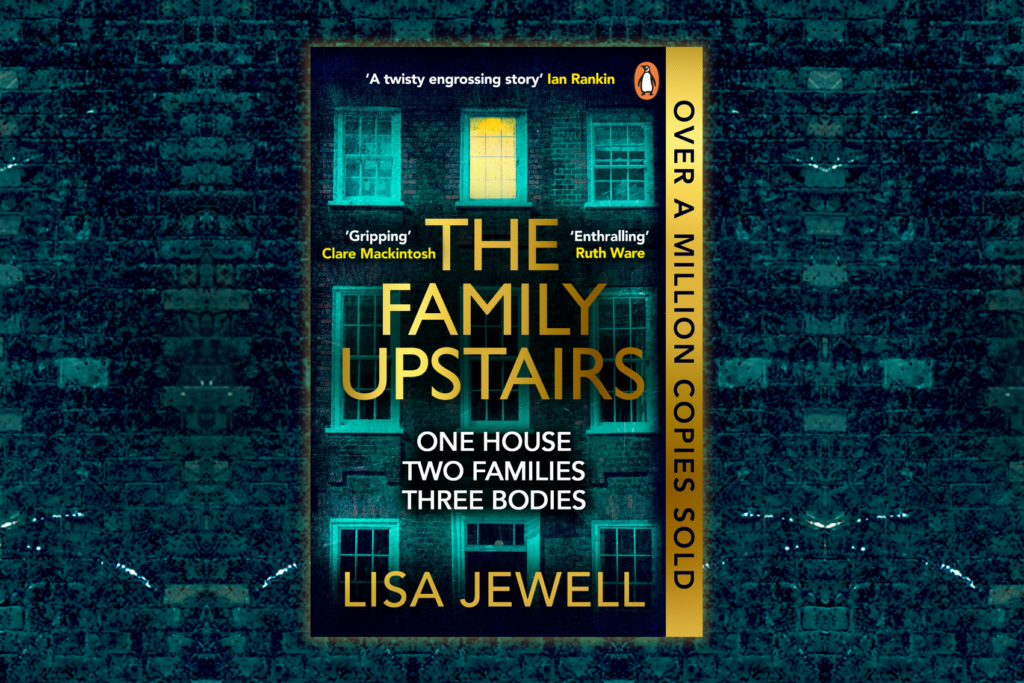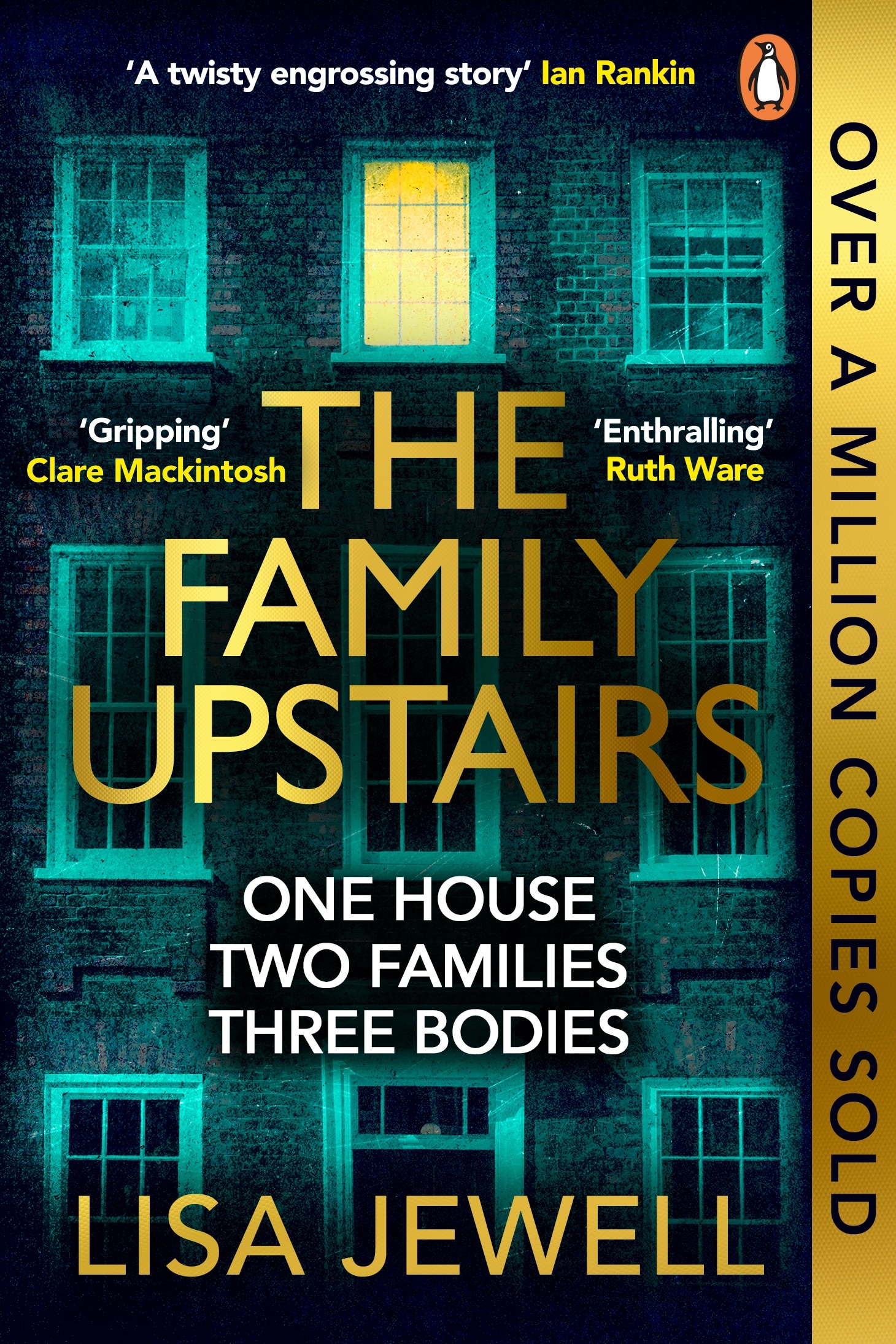Books
Read an extra chapter from The Family Upstairs by Lisa Jewell
The Family Upstairs is one of Lisa Jewell’s most popular novels. It has sold over a million copies worldwide, and was followed by a hugely successful sequel, The Family Remains. Now, we are releasing the bonus chapter Lisa Jewell wrote for a bookseller special edition of The Family Upstairs when it was first published. Warning: spoilers ahead.
The novel starts with a healthy baby found in the upstairs of a large town-house in Chelsea after three bodies are found dead downstairs: husband and wife Henry and Martina Lamb and David Thomsen. The book is told from three perspectives; Libby, the baby found in the town-house, now grown up and set to inherit the house and uncover her past, and Lucy and Henry, the children of the dead couple Henry and Martina Lamb, who seemed to have died in a suicide-pact all those years ago. Over the course of the thriller, we find out the real reason behind their deaths and Libby’s true identity, uncovering a cult amongst other buried secrets. This bonus chapter is told from Martina Lamb’s perspective, as she gets ready for her thirtieth birthday party, a few years before the events of the novel take place. The chapter shows Martina questioning her indolent existence, and hungry for something new and fulfilling to enter her life.
The Family Upstairs
by
Lisa Jewell
Martina sits at her dressing table and attaches her earrings; clip-on diamante stars from Monty Don that cost almost as much as real diamonds. Her hair is down, black tips sharp against her jawline. She puts a fingertip to her chin and angles her head backwards. She is thirty; tonight is her birthday party. She is no longer young. For so long she has been young. Henry, her husband, is ten years older than her. Florian, the man she was engaged to before she met Henry, was nearly fifteen years older than her. Youth has been everything to her, always. Having children when she was young made her feel if anything, even younger. But now those children are not little anymore. Lucy is eight, Henry is nearly ten. This time next year Henry will have finished primary school. Sometimes she thinks maybe another baby would be the way forward, would pump her briefly full of the elixir of femininity, fecundity, the glow, the excitement, the newness of a fresh life.
But that would mean Henry Sr having any interest in having sex with her. And Henry Sr has no interest in having sex with her whatsoever. He wrinkles his brow at the suggestion, says, well, well, well, you’re still into all that are you? As if she were suggesting a trip to a funfair or a night at a punk concert.
She stands up briefly to close the window behind the dressing table; there’s a sharp wind coming in off the Thames, a shame after an unseasonably warm March day. She’d hoped the party might spill out into the garden.
From downstairs she can hear the sounds of the caterers bringing in the food on metal platters from the van parked outside. She should go and oversee, but for some strange reason she feels disconnected from the event, as if she’s a guest at someone else’s birthday party. As if it’s nothing to do with her.
Henry Sr’s voice blows up the stairs like an air raid warning.
‘Teena!’ He calls her Teena. She doesn’t mind. Three syllables are always cumbersome within a close relationship. ‘Your people are here!’
Your people.
He’s paying for them, but they are her people. Henry does this, he draws fat, immoveable lines between his world and her world. His world is his club, his shoots, his bar, his money, his house, his tailor. Everything else belongs to Martina; your kitchen, your friends, your garden, your laundry, your party. Your children.
She goes to the bedroom door. ‘I’ll be down in a moment,’ she calls to him. ‘They know where the kitchen is.’
She goes into her dressing room and appraises herself in the three separate full-length mirrors that sit on hinges so that she can see herself in three hundred and sixty degrees. She is wearing a jade silk jacket with puffed sleeves and a sash around the waist, tight black trousers and red silk shoes with rosettes. She is looking a little New Romantic tonight. Martina is a big fan of Duran Duran, despite being far too old for such an infatuation. She met Simon le Bon and his wife at a party a year ago and they were the most charming and attractive couple she had ever encountered. She wishes she’d managed to make contact with them again, she would have liked to have been friends with them.
Their friends (or your friends as Henry Sr refers to them) are not her type of people, not really. They are money people, global people, transient people; they are not real. Martina comes from a down to earth family. Her mother is a terrifying matriarch, but has a bottomless heart; all her control comes from a place of love. Her father is distant but sweet; he moved back to Turkey after the divorce and she sees him rarely, but she likes to know that he exists. Her brothers are boisterous and naughty and spoiled and funny. She was brought up in a rambling scruffy house in the Black Forest. She was a tomboy, then at eighteen she was nearly a princess, but instead became a punk and lived for a year in a bedsit in Kensington with cockroaches and damp. Then she met Henry at a hunting party. He teased her about her bleached white hair, the panstick makeup.
‘Pretty girl hiding under all that,’ he’d said. And she’d said, ‘handsome man hiding under that,’ and pointed at his belly and for a moment she’d thought he was going to yell at her. But his face had opened up and he’d guffawed and told her she was funny. ‘Sparky girl, this,’ he’d said, turning to address the other people in the vicinity. ‘Really sparky girl.’
She hadn’t fancied him then, he was not her type at all, not at all. But he’d pursued her and grown on her and then he’d brought her to see this house he was about to buy; an eight-bedroom mansion on the side of the Thames, hemming the backstreets of Chelsea, not far from the punks who congregated on the Kings’ Road every Saturday morning, amongst whose number she had once been.
It had been empty then; bare white walls, curtainless windows, just the raw light reflected off the river streaming through the glass. She’d wandered the rooms imagining the modern art, the white leather sofas, the smoked glass and chrome, the art deco lamps and the animal skin rugs.
It had not turned out like that. It was Henry’s house, always, from the first moment; a physical manifestation of the ruins of his relationship with his father. She allowed him to decorate it in his taste. And that too had grown on her. She even had names for the dead animals that adorned the place. She talked to them, sometimes.
For many years Martina had been content in this existence. Absorbed at first by the work of mothering babies (Henry had offered her a nanny. She’d declined) she hadn’t noticed the gaps opening up inside her, the vacuums. It wasn’t until Lucy’s first day at school that it hit her. All the things she’d thought she might be had evaporated. The punk princess was gone. The ‘sparky girl’ was gone. In her place was a beautiful woman with no purpose, with a husband who didn’t want to touch her, friends who came and went without anyone ever noticing, children who spent most of their days away from her.
For a while the PR company Henry had set up for her had plugged the gaps and stopped the reality bursting through. But then the annual accounts had arrived and she saw she’d lost thousands of pounds, that Henry had been propping up her business with secret payments from his own bank account, that the whole thing was a farce and a folly. A business that makes no money is not a business, it is an indulgence, a toy, a joke.
She’d turned twenty-eight, then twenty-nine and now she is here, two days away from her thirtieth birthday, a beautiful woman, a little too thin (“Eat something, woman,” says Henry. “Have a pie. Have some cake. You’re like a twig.”). There is too much life behind her, and now there is too much life before her. She won’t leave Henry. She loves Henry. He treats her well. There is no other man that she would want. At least, not at the moment.
She turns then and regards the wooden cot in the corner of the room. It is white with blue painted roses on it. Henry chose it in Harrods when she was pregnant with Henry Jr. It cost eight hundred pounds. Both babies slept in it, in this tiny room off their own bedroom. Henry was appalled. Babies belonged in their own rooms, on their own floors. That’s how he’d been raised; in the nursery room at the top of his father’s Lancashire pile, with one nanny after another as his brittle mother kept firing them for looking at her sideways. Martina had wanted the babies right by her bed, maybe even in it. The dressing room was a compromise. Close enough to hear them breathing, to rush to their side when they cried.
Just a few weeks ago Henry had pointed at the cot and said, ‘Time to get rid of that, don’t you think?’
She’d replied very simply; ‘No. I’d like to keep it.’
He hadn’t mentioned it again.
Martina would love to see another baby in there. But that won’t happen now. Not now. It’s too late. Too late for babies and too late for her to be anything other than a trophy wife and a good enough mother.
She could work for charities like the other mothers at the children’s school, but she’s too selfish; if she’s to work, it would be for her. Just for her. And to make her children proud.
Martina turns one last time to see her outfit in the round, to see herself. A thin sad beautiful woman about to celebrate her 30th birthday with people who make her feel nothing.
One day, she thinks to herself, picking up her tiny gold handbag, checking it for the atomiser of her favourite scent, the blister pack of beta blockers in case she feels the anxiety start to descend, the mints in case she finds herself in close conversation with someone important after too many glasses of wine – one day something will happen, just as it happened when she met Henry all those years ago. Something will happen and everything will change.
She clears her throat. She heads downstairs. The house looks beautiful. The party will be fun.



Please note: Moderation is enabled and may delay your comment being posted. There is no need to resubmit your comment. By posting a comment you are agreeing to the website Terms of Use.